| Connecting Dental Materials Sciences to Broader Materials Sciences | |
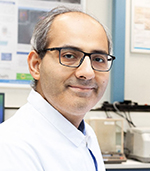 | Amir Zadpoor
Delft University of Technology
Delft,The Netherlands
Presentation Title: From Rational Design to Additive Bio-Manufacturing of Architected, Programmable, and Autonomous Biomaterials |
| Amir Zadpoor is Antoni van Leeuwenhoek Professor and Chaired Professor of Biomaterials & Tissue Biomechanics at Delft University of Technology and Professor of Orthopedics at Leiden University Medical Center. He develops machine learning and 3D/4D (bio)printing techniques for designing and fabricating metamaterials and tissues with unprecedented properties. Moreover, he is a world-recognized expert in origami/kirigami-based (bio)materials combining shapeshifting with additive manufacturing. Prof. Zadpoor has received many awards, including an ERC grant, a Vidi grant, a Veni grant, the Jean Leray award of the European Society of Biomaterials, and the Early Career Award of JMBBM. | |
| |
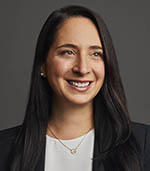 | Emily Cranston
University of British Columbia
Vancouver, Canada
Presentation Title: Engineering Nanocellulose for Emerging Biomedical and Cosmetic Applications |
| Emily D. Cranston is a Professor in Wood Science and Chemical & Biological Engineering at the University of British Columbia and is the President’s Excellence Chair in Forest Bio-products. Emily’s research focuses on sustainable hybrid materials from cellulose and other biopolymers. Her academic path began at McGill University where she received her BSc in Chemistry and a PhD in Materials Chemistry. The study of value-added products from cellulose took her to Stockholm, Sweden as a postdoctoral researcher at KTH Royal Institute of Technology. Emily was the 2018 American Chemical Society – Kavli Foundation Emerging Leader in Chemistry Lecturer and was an NSERC E.W.R. Steacie Memorial Fellow from 2021-2024. In 2024, she was elected to the Royal Society of Canada’s College of New Scholars, Artists and Scientists and was awarded the Rutherford Medal in Chemistry. | |
| |
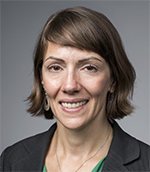 | Danielle Benoit
University of Oregon
Eugene, OR USA
Presentation Title: Polymeric Materials for Health Applications |
| Danielle S.W. Benoit is the Inaugural Lorry Lokey Chair and Professor in the Department of Bioengineering at the University of Oregon. Prof. Benoit directs an internationally recognized research program focused on therapeutic biomaterials with emphasis on challenging clinical problems and translational solutions involving cell transplantation and drug delivery. As a leader in the field of therapeutic biomaterials, her work has provided insights into development and translation of engineered extracellular matrices for bone allograft repair, hydrogel depots for sustained release of peptides, nucleic acids, and small molecule drugs, pH-responsive nanoparticles for nucleic acid and small molecule drug delivery, novel targeting strategies for bone-specific delivery of therapeutics, and development of tissue mimetics for the salivary gland and macula. Prof. Benoit has been recognized by numerous awards and accolades for her research program including Fellow of the National Academy of Inventors, BMES, and AIMBE, the 2018 University of Maine Distinguished Alumni Award, the 2016 Kate Gleason Young Engineer of the Year Award, a 2015 Young Innovator Award in Cellular and Molecular Bioengineering, an NSF CAREER Award, and Alex’s Lemonade Stand Young Investigator Award. Prof. Benoit received her undergraduate degree in Biological Engineering from the University of Maine and M.S. and Ph.D. in Chemical Engineering from the University of Colorado, where she was mentored by Dr. Kristi Anseth. She then trained at the University of Washington as a Damon Runyon Cancer Research Foundation Postdoctoral Fellow, working with Drs. Patrick Stayton and Allan Hoffman. Prof. Benoit joined the faculty at the University of Rochester in 2010 and moved to the University of Oregon in 2022. | |
| |
| Connecting Laboratory Studies with Clinical Performance of Dental Materials | |
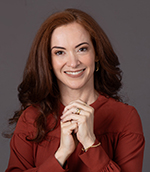 | Alessandra Reis
University of Ponta Grossa
Ponta Grossa, PR, Brazil
Presentation Title: Why Clinical Trials are Important for the Dental Materials Field? |
| Professor Alessandra Reis holds a PhD in Dental Materials from the School of Dentistry at the University of São Paulo (FOUSP) and completed postdoctoral training in Systematic Literature Review at the Federal University of Rio de Janeiro (UFRJ). She is currently an Associate Professor at the State University of Ponta Grossa (UEPG, PR), where she teaches both undergraduate and graduate courses. She is also a Level 1 Research from the Fellow of the Brazilian National Council for Scientific and Technological Development (CNPq). Her primary research interests include adhesion to dental substrates and dental bleaching. She has extensive experience in laboratory studies on dental materials, randomized clinical trials, and systematic reviews. Professor Reis serves on the editorial boards of leading international journals such as Journal of Adhesive Dentistry, Journal of Dentistry, and Journal of Esthetic and Restorative Dentistry, and she is also an Associate Editor of Brazilian Oral Research. She has published over 480 articles in international journals indexed in PubMed, and her h-index is 60 (JCR). | |
| |
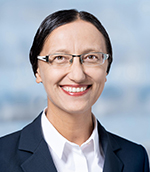 | Mutlu Özcan
University of Zurich
Zurich, Switzerland
Presentation Title: Comparative Laboratory and Clinical Data of Indirect Restorative Procedures |
| Mutlu Özcan has earned her PhD in 2003 at the University of Groningen, The Netherlands. She is currently the Director of Center for Dental Medicine, and Chair of Clinic for Masticatory Disorders and Dental Biomaterials at the University of Zurich. She has authored more than 950 ISI Web of Science indexed original scientific and clinical publications (h-factor: 103), is a well-sought lecturer, receiver of several international awards, and serves for the editorial boards of numerous scientific journals. She is the Past-president of the International Academy of Adhesive Dentistry (IAAD), IADR / IADR Clinical and Translational Science Network / IADR Dental Materials Group (DMG), Fellow of Academy of Dental Materials (FADM), Fellow of Royal College of Physicians and Surgeons of Glasgow, FDS RCPS (Glasgow), and Edinburg- FDSRCPS (Edin), United Kingdom. Prof. Özcan is the recipient of the prestigious “2018 IADR Distinguished Scientist Wilmer Souder Award”. In the same year, she received “Dr. honoris causa” title from Romania. Her clinical expertise is on reconstructive dentistry and her scientific work focuses on translational and clinical research with a particular emphasis on the development and application of dental biomaterials. | |
| |
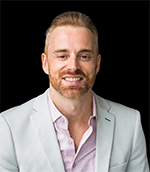 | Rafael Moraes
Universidade Federal de Pelotas
Pelotas, RS Brazil
Presentation Title: How Can Laboratory Studies Can Better Predict Clinical Failures? Can AI Help Improve Experimental Design? |
| Associate Professor at the Universidade Federal de Pelotas, Brazil DDS, PhD in Dental Materials, Universidade Estadual de Campinas, Brazil Fellow of the Academy of Dental Materials (ADM) Currently serves as a Board Member and Social Media Chair Research interests focus primarily on dental materials and restorative dentistry, including in vitro analysis, clinical performance of restorations, and evidence synthesis. | |
| |
| Connecting Dental Materials with Oral Tissue/Environment | |
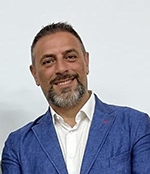 | Salvatore Sauro
Universidad CEU-Cardenal Herrera
Valencia, Spain
Presentation Title: The Rise of Innovative “Bioactive” Materials: Are They Redefining Restorative Dentistry? |
| Dr. Salvatore Sauro (past president of DMG-IADR group) is a professor in dental biomaterials at the “Facultad de Ciencias de la Salud, Universidad CEU-Cardenal Herrera, Valencia, Spain”, coordinator of the "Dental Research" and Principal Investigator)of the research group "In Situ Dental Tissues Engineering and Minimally Invasive Therapeutic Adhesive Rehabilitation"(BIODENT-REG). He is also a visiting and honorary professor in several Dental schools/universities He obtained his Ph.D. in "Dental Biomaterials Research Pre-Clinical Dentistry" at King's College London Dental Institute, where he continued his scientific work as a post-doctorate and then as a research associate in "Adhesive dentistry and dental bioactive materials research." Dr. Sauro has been working in dental biomaterials, preventive and minimally invasive dentistry research for more than 15 years (H-Index: 45) and he has published more than 190 articles in international peer-reviewed journals in the dental biomaterials/bioactivity field, along with several research abstracts and lectures in international conferences. Dr. Salvatore Sauro's work focuses on developing bioactive and biomimetic dental restorative materials that release fluoride, calcium, and phosphates, to remineralize dental tissues and help in preventing tooth decay and dental erosion when in the presence of saliva or other bodily fluids. Furthermore, his research focuses also on developing bioactive materials that can promote the regeneration of dental pulp and bone tissues. His research is paving the way for new treatments that can enhance the effectiveness and biocompatibility of these dental restorative materials, making them suitable for clinical applications. | |
| |
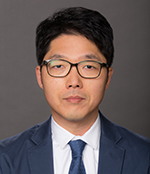 | Geelsu Hwang
University of Pennsylvania
Philadelphia, PA, USA
Presentation Title: Interactions of Dental Materials with Oral Biofilms |
| Dr. Geelsu Hwang is an associate professor in the Department of Preventive and Restorative Sciences at the University of Pennsylvania School of Dental Medicine. Dr. Hwang has a unique career in the field of dental bioengineering research. He completed his Ph.D. in Chemical and Biomolecular Engineering. He enhanced his academic and technical skills in Environmental Engineering and Oral Microbiology with post-doctoral fellowships at the University of Alberta and the University of Rochester Medical Center. Since he joined Penn Dental Medicine, he has been applying various engineering principles and tools to understand the pathogenesis of microbially-induced infectious diseases and developing novel therapeutic strategies. So far, he proposed numerous groundbreaking inventions which include a novel nonbiocidal therapeutic intervention against pathogenic bacterial-fungal biofilms, bimodal piezoelectric biomaterials and a self-powering smart dental implant system. He has received numerous NIH and NSF research grants. He is also a recipient of the IADR Innovation in Oral Care Awards. He is establishing a unique research career in oral health research as an engineer | |
| |
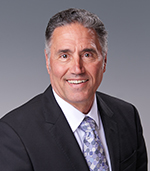 | Jack Ferracane
Oregon Health & Science University
Portland, OR USA
Presentation Title: Publishing in Dental Materials: Debunking Myths and Future Perspectives |
| Jack Ferracane received a B.S. in Biology from the University of Illinois, and an M.S. and Ph.D. in Biological Materials from Northwestern University. He is a founding fellow and past-President of the Academy of Dental Materials. He is a past-President of the Dental Materials Group of the International Association for Dental Research. He is a past-President of the American Association for Dental Research (now American Association for Dental, Oral and Craniofacial Research). He is the recipient of the Distinguished Scientist Wilmer Souder Award from the International Association for Dental Research, the Founders Award from the Academy of Dental Materials, and the Hollenback Award from the Academy of Operative Dentistry. He is an honorary member of the American College of Dentists and the Oregon Dental Association. He is a fellow of the American Institute of Medical and Biological Engineering. He serves on the editorial board of ten journals, and is Editor-in-chief of a new journal published by the ADA and Elsevier entitled, JADA Foundational Science. He is a past Associate Editor of the Journal of Dental Research and Odontology. He has authored a textbook entitled “Materials in Dentistry. Principles and Applications.” He is co-editor of a textbook entitled “Craig’s Restorative Dental Materials.” He is a co-editor of a textbook entitled “Summitt’s Fundamentals of Operative Dentistry. A Contemporary Approach.” He has published and lectured extensively on dental materials, including dental composites, adhesives, amalgam, and practice-based dental research. His current research interests are in developing new monomers for enhanced dental composites, studying the factors that affect biofilm formation around dental composite restorations leading to the recurrence of caries lesions, the use of bioactive glasses as potential antimicrobial and mineralizing agents in resin-based dental materials, and conducting clinical studies in private practices and predoctoral clinics in the dental school. His research has been funded by the NIH/NIDCR as well as private industry. | |
| |
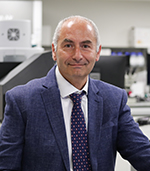 | Nick Silikas
University of Manchester
Manchester, England
Presentation Title: Publishing in Dental Materials: Debunking Myths and Future Perspectives |
| He is a Professor in Oral Biomaterials Sciences and currently he is the Dean of the Dental School in The University of Manchester. He has worked within the field of dental biomaterials since 1996 and have over 200 publications in several areas including nanocomposites used in dentistry as restorative dental materials, surface characterization of interfaces, and influence of nanoparticles on aesthetics and surface properties. This work has been extended to dental implants and formation of nanoparticles on their surface that is a critical factor for their osseointegration and clinical success. He is a Fellow of The Academy of Dental Materials, FADM, since 2004 and a Fellow of the College of General Dentistry (FCGDent). He has over 14,400 citations with an h-index of 66. He is the Editor for “Dental Materials“and the Associate Editor for Dental Materials for the “European Journal of Oral Sciences”. He has extensive links with research groups all over the world. These include several European Universities (University of Munich, University of Zurich, University of Erlangen, University of Jena, Athens Dental School, University of Madrid); in Asia University of Singapore, Africa University of Alexandria, and also in the USA (University of Boston, University of Florida, University of Connecticut) and in Brazil (University of Sao Paulo, University of Fortaleza, University of Rio, University of Passo Fundo, University of Bauru). | |